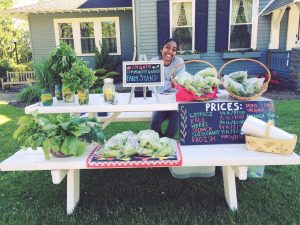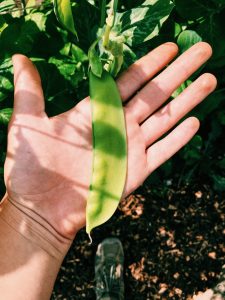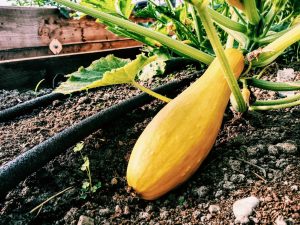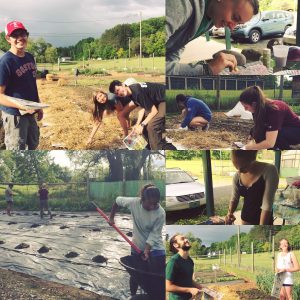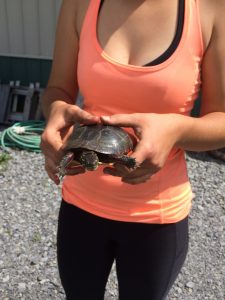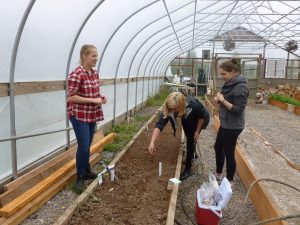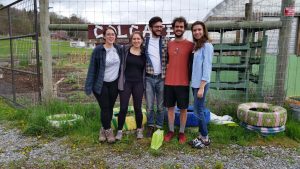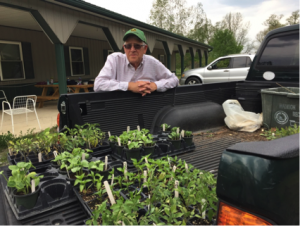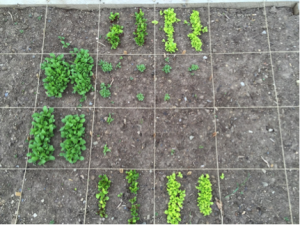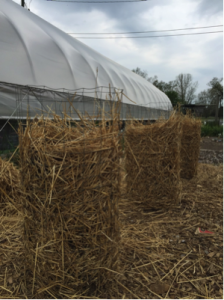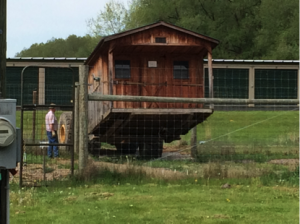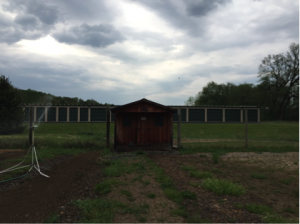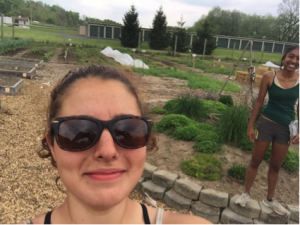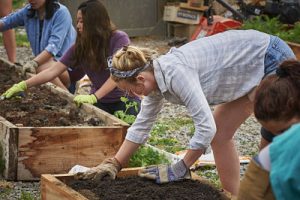No matter how careful you are about keeping your garden clean and maintained, you are bound to run into some pests. At the Colgate Community Garden we have lots of critters that get to our food and it is important to be proactive in controlling them. To do so, we choose to use only organic methods as to reduce our impact on the surrounding land and create the healthiest produce possible. We have compiled some of our methods here for you so that you may implement them in your own garden or plot at the CCG.
Some common pests in the Upstate NY area include slugs, beetles, grasshoppers, and birds. The most vulnerable time for your plants is when they are young, as they are weak, and when they begin producing fruit.
It is often possible to determine which pest is getting at your plants based on the type of damage they leave. Once the pest is identified, you can begin steps towards prevention. Below are some common pests at the Colgate Community Garden, the damage they leave, and the steps we take to prevent them.
Common Pests and their damages
Beetles: Beetles typically leave small pinholes in the leaves of young leafy plants. They especially love our arugula and spinach plants. To keep out beetles we cover our plants with Diatomaceous earth after every rain. This method is explained below.
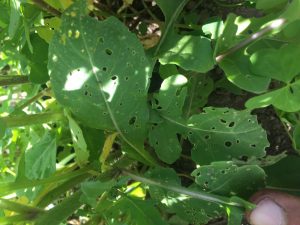
Slugs: Slugs typically leave larger damage than hard-shelled insects at the center and edges of leaves. To keep out slugs we use cups of beer in the ground. Slugs are attracted to the yeast in the beer and when they go for it, they drown in the cup. This method is further explained below.
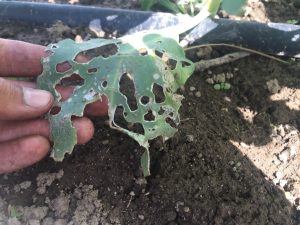
Cutworms: These worms are most dangerous to our tomato plants, but can affect a wide variety of species,. They work by wrapping around the base of the plant tightly and severing the stem. The plant subsequently dies. To prevent these worms, we wrap the base of our tomato plants in a ring of newspaper. This method is further explained below.
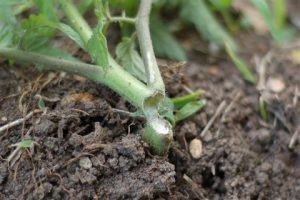
Birds: Birds especially love berries and corn and thus your plants are most vulnerable to birds in their later stages. PLus, birds love earthworms, which are super beneficial to the soil health of a garden. However, if birds are not a huge problem in your garden, we suggest you embrace them. Most of the time, birds are also hardworking garden allies, munching away on annoying pests like snails, slugs, and harmful insects.
Grasshoppers: Grasshoppers are sneaky pests and it took us a while to figure out they were getting to our plants. The damage looks similar to beetle and slug damage: large bites out of the leaves of plants. To prevent grasshoppers you can use diatomaceous earth or try the flour method, explained below.
Organic pest control options
Beer: Simply fill a cup or jar about ¾ of the way to the top with dark ale. Bury the cup in the dirt so that the rim is just slightly above the soil. The slugs will be drawn to the yeast in the beer, and once they lean in for a quick sip, should fall right in and drown. This often captures other pests as well.
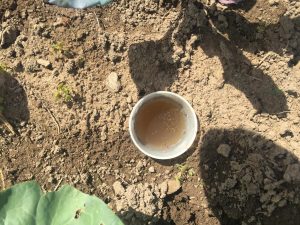
Diatomaceous Earth: This is a natural product collected from the ocean; it is made up of tiny crushed up shells of creatures called diatoms. It feels soft in our hands but to an insect, walking on diatomaceous earth is like walking on broken glass. Beetles to caterpillars will be lacerated and dehydrated from the diatomaceous earth and will thus die. Spreading a thin layer on the leaves of affected plants is helpful in controlling a wide variety of crawling insects. While diatomaceous earth is safe for humans, we recommend using a dust mask and eye covering to avoid inhaling it or getting it in your eyes as it is microscopically sharp. Diatomaceous earth washes away so should be replaced after rainfalls.
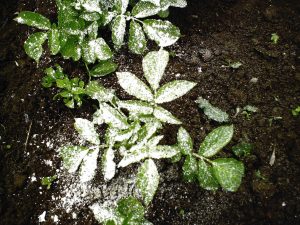
Flour: Although we have not tried this method at the garden, we have read that it works similarly to diatomaceous earth in the prevention of grasshoppers. The flour is harmless to the plant but will coat the grasshopper’s wings and clog it inside. If you attempt this method, make sure you are using all-purpose flour without any added ingredients!
Newspaper wrapping (tomatoes): To prevent cutworms, we wrap a thin layer of newspaper loosely around your tomato plants when planting. To do this, simply rip a 1 inch strip of newspaper and loosely wrap it around the base of the plant a few times. Then place the plant in the earth and cover the bottom half of the paper collar with dirt so it stays on.
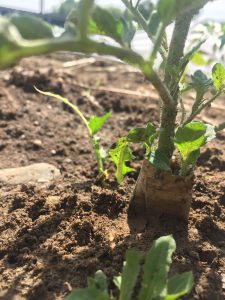
Basil: The oils in basil are said to repel thrips, flies and mosquitoes. We plant basil alongside tomatoes which is said to make them larger and tastier. Basil also tends to keep away tomato hornworms.
Marigolds: Like basil, marigolds are another addition to your garden with a dual purpose. The marigolds are bright and beautiful, and also provide a well-known pest control. Make sure you choose scented marigolds if you are using them as a repellent. It is also important to note that they may attract other insects such as spider mites and snails, so do not use marigolds if you have a problem with these other pests!
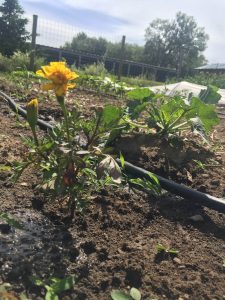
Covering: If you are unsure what is getting to your plants, and they are still weak, you can try covering them with a semi-permeable covering. We use Agribon, which is permeable to sunlight and water, yet helps keep bugs out. This covering can also help young plants adjust to the outdoors if they were grown in the comfort of a greenhouse.
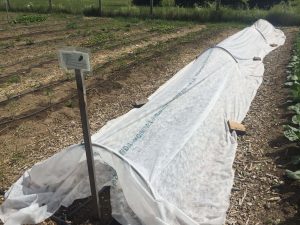
Neem Oil: Neem oil acts as an organic pest control for some insects by disrupting their reproductive cycle, while causing other insects to stop eating and starve. Neem oil also remains effective even after the spray has dried on the plant, so it can be used as a preventative insecticide. Unlike synthetic insecticides, neem oil will not harm beneficial insects. It is important to record how often you spray any form of pesticides on your plants so you do not over cover.
Introduction of other beneficial insects: Not all insects that come into your garden are harmful. Many are good pollinators and many others will eat harmful insects. Therefore, it may be useful to encourage these beneficial insects to enter your garden. It is possible to breed them in your garden, but it may be cheaper and more simple to plant items in your garden that these insects, such as ladybugs, lacewings, hoverflies, and some wasps are attracted to. Each of these insects feasts on different pests so be sure to look up which you need to encourage in your garden. Additionally, each is attracted by different plants, such as cilantro flowers, Queen Anne’s Lace, tubular flowers, or clover. Beneficial insects are not attracted to frilly double flowers such as double petunias or hollyhocks, because it is too difficult for them to reach the pollen in a double blossom. It is important to provide a variety of flowers that bloom at different times throughout the season to attract the most beneficial insects to the garden.
More sources for Organic Pest control
Neem Oil
Beneficial insects
Flour method
Bird control
More pests we didn’t mention!
More creative organic control methods
More plants that double as repellents







 Despite the disappointing loss of the greenhouse at the garden this past winter, other operations at the garden are in full swing. Peas, potatoes, radishes, beets and turnips have been planted. Two new rain barrels have been installed next to the garden’s small shed (pictured left). Raspberry plants and apples trees are starting to bud, the garlic that was planted last fall is growing beautifully, and plenty of other green things (weeds-yikes!) can be found all around the garden.
Despite the disappointing loss of the greenhouse at the garden this past winter, other operations at the garden are in full swing. Peas, potatoes, radishes, beets and turnips have been planted. Two new rain barrels have been installed next to the garden’s small shed (pictured left). Raspberry plants and apples trees are starting to bud, the garlic that was planted last fall is growing beautifully, and plenty of other green things (weeds-yikes!) can be found all around the garden. 
